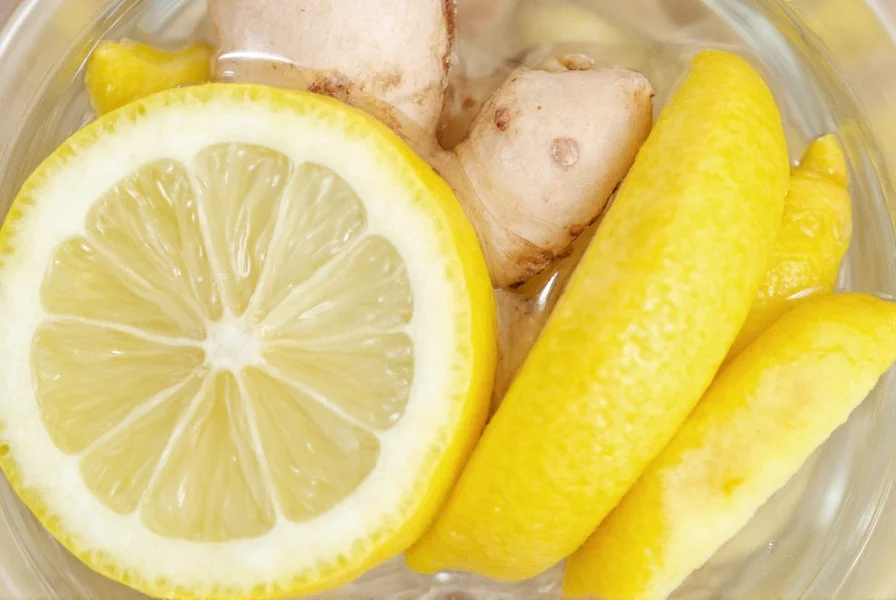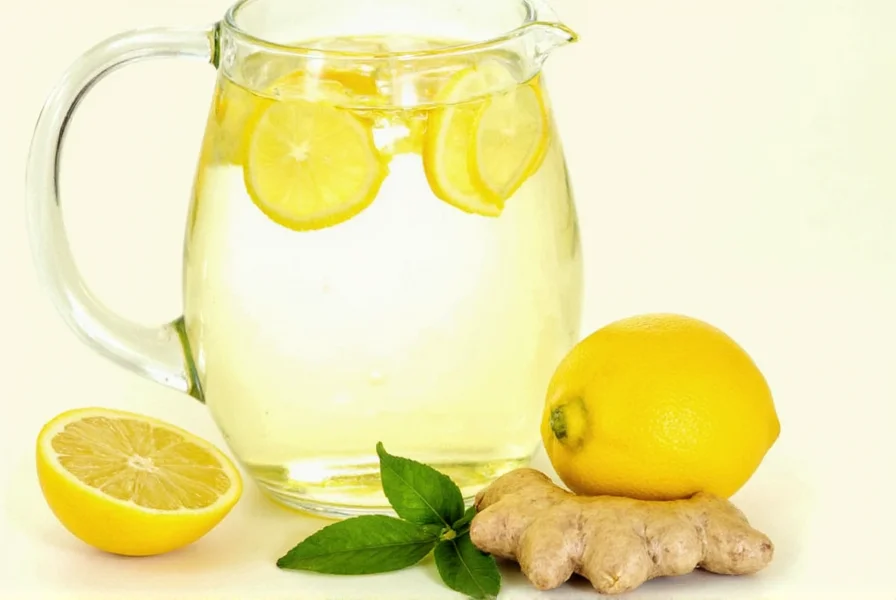For those seeking natural ways to enhance daily wellness routines, lemon and ginger water has gained significant popularity. This simple beverage combines two powerful ingredients with documented health properties. While not a miracle cure, understanding the actual science-backed benefits can help you make informed decisions about incorporating it into your lifestyle.
The Science Behind Lemon and Ginger Components
Lemons contain citric acid, vitamin C, and various flavonoids with antioxidant properties. A single lemon provides about 31mg of vitamin C, which is 51% of the daily recommended value. Ginger's primary bioactive compounds are gingerols and shogaols, which research shows have anti-inflammatory and antioxidant effects.
When combined in water, these ingredients create a beverage that supports hydration while delivering these beneficial compounds. The warm temperature often used for ginger tea enhances the extraction of ginger's active components, making them more bioavailable.

Evidence-Based Health Benefits
Understanding the actual research behind lemon ginger water benefits helps separate fact from popular myths. Let's examine what science actually supports:
Hydration Enhancement
Proper hydration remains one of the most fundamental yet overlooked aspects of health. Adding lemon and ginger to water creates a naturally flavored beverage that many find more appealing than plain water, potentially increasing daily fluid intake. Research published in the European Journal of Clinical Nutrition confirms that flavoring water with natural ingredients can improve hydration habits, particularly among those who struggle to drink enough water.
Digestive Support Properties
Ginger has been extensively studied for its digestive benefits. A comprehensive review in Nutrients journal concluded that ginger effectively reduces nausea and vomiting, particularly for pregnancy-related morning sickness and chemotherapy-induced nausea. The same review noted ginger's ability to accelerate gastric emptying, which may help reduce bloating and discomfort after meals.
Lemon's citric acid may stimulate bile production, potentially supporting fat digestion. While research specifically on lemon water's digestive effects is limited, traditional medicine systems have long used citrus for digestive support.
Antioxidant and Anti-inflammatory Effects
The combination provides multiple antioxidants. Vitamin C from lemon acts as a powerful antioxidant, while gingerols in ginger demonstrate significant anti-inflammatory properties. A study in the Journal of Medicinal Food found that ginger supplementation reduced markers of inflammation in patients with osteoarthritis.
| Benefit | Scientific Support Level | Key Research Findings |
|---|---|---|
| Nausea reduction | Strong | Ginger effective for pregnancy nausea, motion sickness, and chemotherapy side effects |
| Anti-inflammatory effects | Moderate | Ginger reduces inflammatory markers; may help with arthritis symptoms |
| Hydration improvement | Good | Flavored water increases fluid consumption compared to plain water |
| Weight loss promotion | Weak | No direct evidence lemon ginger water causes significant weight loss |
Immune System Support
Vitamin C plays a crucial role in immune function, though it won't prevent colds for most people. Research in Vitamins journal indicates vitamin C may shorten cold duration slightly. Ginger's anti-inflammatory properties may also support immune response regulation. However, lemon ginger water shouldn't be viewed as a substitute for other immune-supporting practices like adequate sleep and balanced nutrition.
Common Misconceptions and Limitations
Despite widespread claims, certain purported benefits of lemon ginger water lack scientific validation:
- Detoxification claims: Your liver and kidneys naturally detoxify your body; no evidence suggests lemon ginger water enhances this process
- Significant weight loss: While it may replace higher-calorie beverages, no research shows it directly causes weight loss
- pH balance alteration: The body tightly regulates pH; drinking lemon water doesn't meaningfully change your body's acidity
- Cancer prevention: While antioxidants may support overall health, no evidence shows this beverage prevents cancer
Practical Considerations and Preparation
To maximize potential benefits while minimizing risks, consider these evidence-based preparation tips for homemade lemon ginger water:
- Use fresh ingredients rather than powders or extracts for maximum nutrient content
- Add lemon after cooling ginger tea slightly (below 140°F/60°C) to preserve vitamin C
- Steep fresh ginger for 5-10 minutes to extract active compounds
- Consider adding a pinch of black pepper to enhance ginger's bioavailability
- Avoid excessive consumption if you have acid reflux or sensitive teeth

Who Should Exercise Caution
While generally safe, certain individuals should moderate their consumption of lemon ginger water:
- People with gastroesophageal reflux disease (GERD) may experience worsened symptoms from the acidity
- Those taking blood thinners should consult their doctor about ginger consumption
- Individuals with kidney stones may need to limit citrus due to oxalate content
- Pregnant women should moderate ginger intake (no more than 1g daily)
Realistic Expectations for Daily Consumption
When evaluating the potential health impact of drinking lemon and ginger water regularly, it's essential to maintain realistic expectations. This beverage works best as part of a comprehensive wellness approach rather than a standalone solution. Consider it a supportive element alongside balanced nutrition, regular exercise, and adequate sleep.
The most significant benefit for many people is simply replacing sugary beverages with this healthier alternative. For those seeking natural digestive support or a refreshing hydration option, lemon ginger water offers a scientifically supported option with minimal risks when consumed in moderation.
Frequently Asked Questions
Does lemon ginger water really help with weight loss?
Lemon ginger water alone doesn't cause significant weight loss. However, it can support weight management by replacing high-calorie beverages and potentially reducing appetite. The hydration benefits may also help distinguish true hunger from thirst. Any weight loss effects are modest and work best as part of a comprehensive approach including diet and exercise.
How much lemon ginger water should I drink daily?
Most experts recommend 1-2 cups (8-16 ounces) daily. For ginger specifically, the FDA considers up to 4 grams daily safe for most adults, but 1 gram is sufficient for potential benefits. Excessive consumption may cause digestive discomfort or interact with certain medications. Start with smaller amounts to assess your tolerance.
Can lemon ginger water improve digestion immediately?
Some people experience immediate digestive relief from ginger's effects on gastric motility, particularly for nausea. However, more significant digestive benefits typically develop with regular consumption over time. Ginger's effects on accelerating gastric emptying may provide relatively quick relief from bloating after meals for some individuals.
Is hot or cold lemon ginger water more beneficial?
Warm or hot water extracts more gingerols from fresh ginger, potentially increasing anti-inflammatory benefits. However, very hot water can degrade vitamin C in lemon, so adding lemon after the water cools slightly (below 140°F/60°C) preserves more nutrients. Cold preparations still offer hydration and some benefits but with less ginger compound extraction.
How long does it take to see benefits from drinking lemon ginger water?
Some benefits like improved hydration and immediate nausea relief may be noticeable quickly. More significant effects, such as reduced inflammation markers, typically require consistent daily consumption for several weeks. Research on ginger's anti-inflammatory effects generally shows measurable changes after 4-6 weeks of regular consumption at appropriate doses.











 浙公网安备
33010002000092号
浙公网安备
33010002000092号 浙B2-20120091-4
浙B2-20120091-4